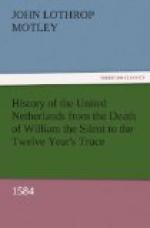I would take this opportunity to repeat my thanks to M. Gachard, Archivist of the kingdom of Belgium, for the uniform courtesy and kindness which I have received at his-hands, and to bear my testimony to the skill and critical accuracy with which he has illustrated so many passages of Belgian and Spanish history.
31, Hertford-street, may-fair, November llth 1860.
THE UNITED NETHERLANDS.
CHAPTER I.
Murder of Orange—Extension of Protestantism—Vast Power of Spain— Religious Origin of the Revolt—Disposal of the Sovereignty—Courage of the Estates of Holland—Children of William the Silent— Provisional Council of State—Firm attitude of Holland and Zeeland— Weakness of Flanders—Fall of Ghent—Adroitness of Alexander Farnese.
William the silent, Prince of Orange, had been murdered on the 10th of July, 1534. It is difficult to imagine a more universal disaster than the one thus brought about by the hand of a single obscure fanatic. For nearly twenty years the character of the Prince had been expanding steadily as the difficulties of his situation increased. Habit, necessity, and the natural gifts of the man, had combined to invest him at last with an authority which seemed more than human. There was such general confidence in his sagacity, courage, and purity, that the nation had come to think with his brain and to act with his hand. It was natural that, for an instant, there should be a feeling as of absolute and helpless paralysis.
Whatever his technical attributes in the polity of the Netherlands—and it would be difficult to define them with perfect accuracy—there is no doubt that he stood there, the head of a commonwealth, in an attitude such as had been maintained by but few of the kings, or chiefs, or high priests of history. Assassination, a regular and almost indispensable portion of the working machinery of Philip’s government, had produced, in this instance, after repeated disappointments, the result at last which had been so anxiously desired. The ban of the Pope and the offered gold of the King had accomplished a victory greater than any yet achieved by the armies of Spain, brilliant as had been their triumphs on the blood-stained soil of the Netherlands.
Had that “exceeding proud, neat, and spruce” Doctor of Laws, William Parry, who had been busying himself at about the same time with his memorable project against the Queen of England, proved as successful as Balthazar Gerard, the fate of Christendom would have been still darker. Fortunately, that member of Parliament had made the discovery in time— not for himself, but for Elizabeth—that the “Lord was better pleased with adverbs than nouns;” the well-known result being that the traitor was hanged and the Sovereign saved.




